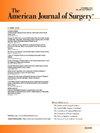在急诊剖腹手术中,虚弱会影响所有老年成人群体的预后
IF 2.7
3区 医学
Q1 SURGERY
引用次数: 0
摘要
背景:在接受外科急诊的老年人中,虚弱对术后并发症的定量影响尚不清楚。方法采用2013-2019ACS-NSQIP数据库,筛选年龄≥65岁的急诊剖腹手术患者。使用改良的衰弱指数-5因子(mFI-5)测量衰弱程度。我们检查了30天死亡率、出院回家、术后并发症和意外再入院。多变量逻辑回归检验了虚弱和结果之间的关系。结果共纳入52356例患者。中位年龄为76岁(70-82岁)。大多数患者(68%)的mFI-5评分在0.2 - 0.5之间。较高的衰弱指数与较高的死亡率和较短的生存期相关(log-rank p < 0.001)。在多变量分析中,较高的虚弱指数与死亡率增加、肺炎、尿路感染、呼吸衰竭、急性肾损伤和再入院呈线性相关。结论虚弱程度的增加不仅会增加术后不良预后的风险,而且会增加出院后功能进一步丧失和恶化的风险。本文章由计算机程序翻译,如有差异,请以英文原文为准。
Frailty impacts outcomes for all older adult age groups in emergency laparotomy
Background
The quantitative effect of frailty on post-operative complications in older adults undergoing surgical emergencies is not well understood.
Methods
The 2013-2019ACS-NSQIP database was used to identify emergency laparotomy patients≥65 years. Frailty was measured using the modified-frailty-index-5 factors (mFI-5). We examined 30-day mortality, discharge to home, post-operative complications and unplanned readmissions. Multivariable logistic regression examined the association between frailty and outcomes.
Results
52,356 patients were included. The median age was 76(70–82) years. Most patients (68 %) had an mFI-5 score between 0.2 and 0.5. Higher frailty index was associated with higher mortality and shorter length of survival (log-rank p < 0.001). On multivariable analysis, a higher frailty index was associated with increased mortality, pneumonia, urinary tract infection, respiratory failure, acute kidney injury, and readmission in a linear fashion.
Conclusion
Increasing levels of frailty not only increase the risk of adverse post-operative outcomes, but also increase the risk of further functional loss and deterioration after discharge.
求助全文
通过发布文献求助,成功后即可免费获取论文全文。
去求助
来源期刊
CiteScore
5.00
自引率
6.70%
发文量
570
审稿时长
56 days
期刊介绍:
The American Journal of Surgery® is a peer-reviewed journal designed for the general surgeon who performs abdominal, cancer, vascular, head and neck, breast, colorectal, and other forms of surgery. AJS is the official journal of 7 major surgical societies* and publishes their official papers as well as independently submitted clinical studies, editorials, reviews, brief reports, correspondence and book reviews.

 求助内容:
求助内容: 应助结果提醒方式:
应助结果提醒方式:


